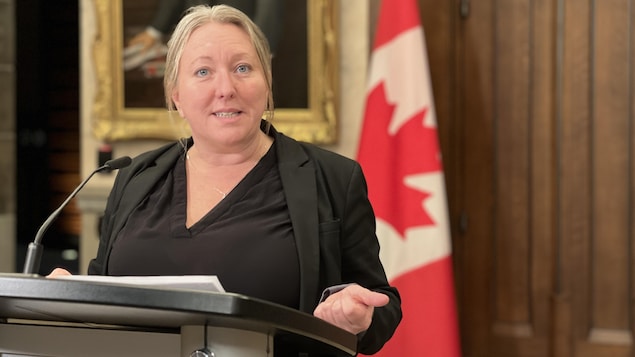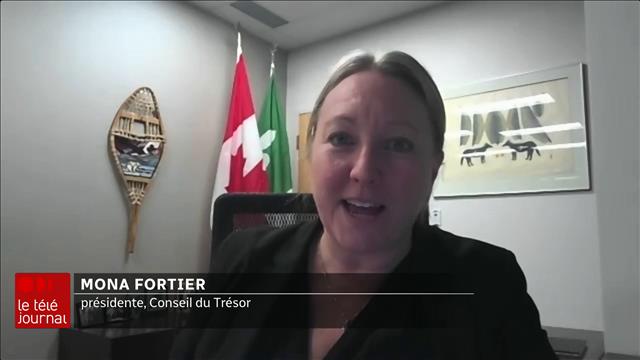
The measure will be phased in from Monday 16 January 2023, with full implementation by 31 March.
In September, employees returned to the office under different models at different companies, and we learned a lot. We relearned how much we share experiences in person. They are essential for organized, cooperative and successful organizations
Treasury Board President Mona Fortier said at a press conference Thursday.
This new model is applicable throughout the core public administration and it is strongly recommended that specialized agencies adopt a similar strategy.
mentioned TBS In a joint briefing on Thursday.
” We want to see equity in all departments across government. »
The TBS He justified his decision by saying this policy Aims to clarify how hybrid work is applied
And this common hybrid working model will be standardized across government.
A simple hybrid model is developed. We want to make sure people can promote inclusion and diversity. We want to be fair, and with the experiments we’ve done over the last six months, we want to adapt our model to make sure we can better serve Canadians.
Mona Fortier explained.
At present and since the implementation of various return plans for Federal Civil Servants, Hybrid work patterns can vary from one department and agency to another.
At present, the TBS said in its information document Hybrid work is the future of public service
And that’s a simple pattern Ensure consistency and fairness across the federal government
.
A two- or three-day face-to-face, 40% to 60% of the regular schedule, is the default model. Other models may be justified in very limited circumstances, pending management approval, the Treasury Board office added.
Disappointment and anger towards the union
The Public Service Alliance of Canada (PSAC) on Thursday questioned the Treasury Board’s lack of openness and communication, calling for the decision A clear breach of good faith bargaining
.
We are very disappointed and angry because we expected all unions to negotiate a return to work for federal civil servants and Ms. Fortier did nothing.
Yvan Barriere, Public Service Alliance of Canada (PSAC) regional executive vice-president for Quebec, announced.
” Arbitrarily, it is not acceptable to ask government employees to gradually return to 60% by March 31. »
The government is accused of speaking double words in the matter of public health.
Mr. [Jean-Yves] Duclos, a former Treasury Board minister and current health minister, holds multiple press conferences about the three respiratory viruses and [répète] Be very careful
He \ he said.
Mr. Telework is part of the current negotiations for collective agreements. Barrier pointed out.
We want to establish some clear parameters and procedures for the public service as a whole, because we know that some departments do well in teleworking, as we proved during the pandemic. There are also sections that suggest performance is higher in telework
Mr. Barrier argued.
The Professional Institute of Public Service of Canada (PIPSC) also condemned the Treasury Board’s return-to-work plan.
For more than two years, we’ve been chanting that any back-to-work plan must have purpose and prioritize employee productivity and health and safety. This regime meets none of these requirements: it is poorly designed, it is oppressive and it makes no sense, and we will not compromise on health and safety.
PIPSC President Jennifer Carr said in a news release.
The Professional Institute of the Public Service of Canada is asking the Treasury Board to back down.

A return to office raises many concerns from federal officials. All civil servants have to come to office 2-3 days a week. So far there is no uniform policy. Matthew Nadon talks to Treasury Board President Mona Fortier.
A plan hailed by mayors
Gatineau Mayor, Frans Belisle, welcomed the Treasury Board’s announcement. According to her, the return of civil servants, albeit partially, will be beneficial to the city centre.
The hybrid formula and the return of civil servants to offices is good news for the vitality of Gatineau and our downtown core. This clear mandate allows traders to better plan and optimize public transport
She said on her Twitter account.
A sentiment shared by Ottawa Mayor, Mark Sutcliffe.
The federal government is Ottawa’s largest employer and a clear future for its workforce is vital to our local economy. When officials return to public offices, it benefits both our transit system and our downtown.
He commented in a written statement.
Between January 2020 and September 2022, the City of Ottawa experienced a 45% decrease in its downtown area, According to a recent study by the Canadian Chamber of Commerce Traffic in downtown Gatineau is down 75%.
The manager of Chateau Lafayette, a downtown Ottawa establishment, welcomed the return of officials with cautious optimism. We hope that when people go back to the office, they will go back to their pre-pandemic habits.
Dominique LaBelle said.
But two days a week is not five days
, she added. Ms. Labelle also predicts lack of consistency in sales.
With information from Frederic Pepin








More Stories
How List Acquisition Helps Your Political Campaign Become Successful
Four escaped cows were caught
A simple administrative decision? | Press